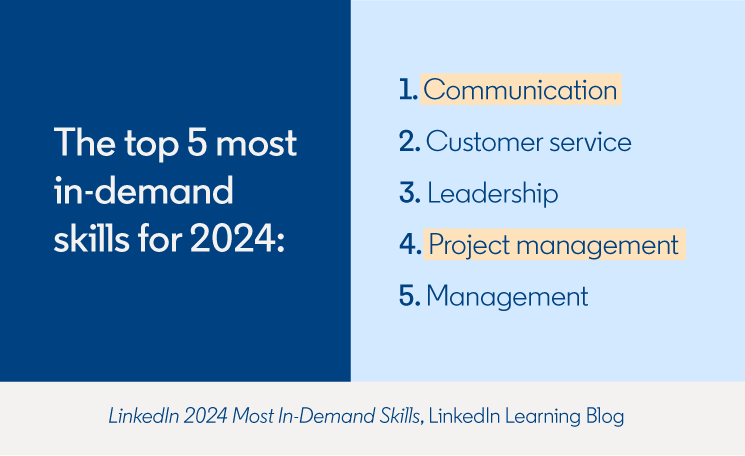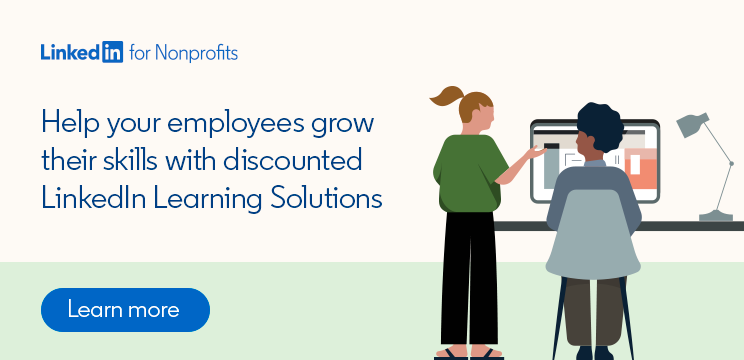
8 Top LinkedIn Learning Courses for Nonprofit Professionals
What kind of skills are most important for your nonprofit career right now? To find out, we looked at the LinkedIn Learning courses that nonprofit professionals on LinkedIn engaged with most over the past year.
Unsurprisingly, a course on artificial intelligence (AI) was high on the list, suggesting that many nonprofit professionals have been taking note of how fast the industry is evolving and are eager to evolve along with it. But it wasn’t just technical skills on their minds — many also sought to build the kind of soft skills that never go out of style.
Whether you’re looking to develop emerging skills or refresh your existing ones, keeping your skill set up to date can help you excel in your role today and unlock new career opportunities. If you’re not sure where to begin with LinkedIn Learning, here are eight of the most popular courses among nonprofit professionals, including one you can watch for free right now.
Grow your skills with 8 of the most watched LinkedIn Learning courses for nonprofit professionals
1. Introduction to Artificial Intelligence
From fundraising to hiring, AI is revolutionizing countless aspects of nonprofit work. Building AI fluency at your organization can help you increase the efficiency of your nonprofit’s day-to-day operations and ensure you’re well-positioned to take advantage of future advancements in this technology.
It can also be good for your career. New data from Microsoft and LinkedIn shows that 71% of leaders would rather hire a less experienced candidate with AI skills than a more experienced candidate without them.
Instructor Doug Rose’s primer on AI can help you get started. In the course, Doug explains the core concepts of AI in an approachable way before focusing on their practical applications in today’s world.
“Introduction to Artificial Intelligence” is included in the unlocked Career Essentials in Generative AI learning path from Microsoft and LinkedIn, so you can watch it for free through 2025 even if your organization doesn’t use LinkedIn Learning yet.
2. Time Management Fundamentals
Being a nonprofit professional can mean having a lot of things you need to get done all at once and as soon as possible — ideally, without sacrificing quality or burning yourself out. In other words, sharp time management skills are a must.
In his course “Time Management Fundamentals,” instructor Dave Crenshaw introduces a “top-to-bottom” time management solution that focuses on three principles of productivity — space, mind, and time — so that you can have “a more organized workspace, increased mental clarity and focus, and a schedule for productivity and balance.”

Here’s an insight from the course to help you move away from one unproductive habit right away:
“Ironically, the biggest obstacle to effective time management is a behavior many believe makes them more productive: multitasking. Attempting to multitask may feel effective, but it’s actually counterproductive. Most people who think they’re multitasking are switch-tasking. Switch-tasking occurs when you try to do two or more attention requiring tasks at the same time. Switch-tasking is a thief. It robs you of time, money, and your mental and emotional health.”
3. Excel Essential Training (Microsoft 365)
One of the most popular spreadsheet programs in the world, Microsoft Excel is well suited to organizations of all sizes and complexities. No matter your position at your nonprofit, chances are you’ll interact with the program in some capacity.
Never used Excel before, or want to make the most of its features? In “Excel Essential Training,” instructor Dennis Taylor will help you develop the skills you need to harness some of Excel’s key functions. Starting from square one, Taylor covers how to use Excel to create formulas, use simple functions, format data, sort and filter large lists, create charts, and more.
4. Communication Foundations
Effective communication is paramount in almost any career path, which explains why communication is the most in-demand skill across industries for 2024, according to LinkedIn data. In Communication Foundations, instructors Brenda Bailey-Hughes and Tatiana Kolovou pose two key questions — “What kind of communication scenarios do you have at work every day?” and “What is the most challenging communication you face?” — and offer tips for communicating clearly and professionally in these situations.
Here’s one of the insights they share:
“Four building blocks create the foundation for successful communication: the people, the message, the context, and effective listening. These four elements are at play in every communication event, whether you’re presenting in front of a thousand people or just making small talk with a coworker.”
5. Digital Marketing Foundations
In the nonprofit sector, every employee is involved in advocating for their organization in one way or another. Whether you’re fundraising, hiring, or managing volunteers, you’re also presenting a narrative about why people should care about your nonprofit’s mission. Digital marketing skills can help.
In Digital Marketing Foundations, instructor Brad Batesole breaks down the fundamental building blocks of digital marketing, from understanding the marketing funnel and buyer’s journey to developing a marketing strategy and creating buyer personas. Whether you’re directly involved in marketing or not, you’ll find tips to help present your nonprofit favorably online.
6. Project Management Foundations
As instructor Bonnie Biafore points out, project management is a skill that every professional can use and almost every professional will need. It’s also among the top five most in-demand skills for 2024, so it’s no surprise that a lot of nonprofit professionals are looking to grow in this area.

Whether you’re new to project management or just want to brush up on the fundamentals, this course is for you. You’ll learn about both the waterfall and agile methodologies of project management, and how to apply these frameworks to projects of all sizes and complexities.
Here’s a top tip Bonnie shares in the course:
“Start by putting together a problem statement that clearly defines the problem or opportunity. Developing this statement can be challenging because people often jump straight to the solutions. But solutions describe the end result, not the initial motivation. One way to backtrack from a solution to the original problem is to ask why.”
7. Agile Foundations
The agile mindset is a methodology for thinking about work in a different and more flexible way. Adopting the agile mindset can help nonprofit professionals adapt to changes faster, perform their myriad functions more efficiently, and work with others to address challenges and improve processes more effectively.
In “Agile Foundations,” you’ll learn about the fundamental concepts that go into building an agile team. Instructor Doug Rose defines the agile manifesto, outlines its important values and principles, and discusses how to apply these values and principles to day-to-day work challenges to boost your team’s productivity.
8. Nonprofit Management Foundations
Whether you’re already managing a nonprofit or you aspire to a leadership role, one of the most valuable ways you can use your personal development time is learning how to be a more effective team leader. Incorporating foundational management skills into your day-to-day work can help you stand apart and demonstrate that you’re ready to take on more responsibility.
Instructor Leslie Crutchfield imparts exactly the kind of skills and knowledge you’ll need to make the case for yourself in her course “Nonprofit Management Foundations.” Along the way, she provides practical insights on everything from leadership strategies and fundraising to recruiting and financial management.
Here’s one of the top tips that Leslie shares:
“You can develop a winning strategy for your nonprofit by developing your own strategic plan. This plan should include both intensive internal and external thinking. It begins with articulating the mission and your vision for the organization and also includes the assessment of the external landscape in which you play.”
There’s more to explore on LinkedIn Learning
These are just some of the more than 22,500 on-demand courses that you’ll find on LinkedIn Learning, which is available at a deep discount to eligible nonprofits.
Help your nonprofit team develop essential skills and grow their careers at your organization. Reach out to our sales team today to get started.

